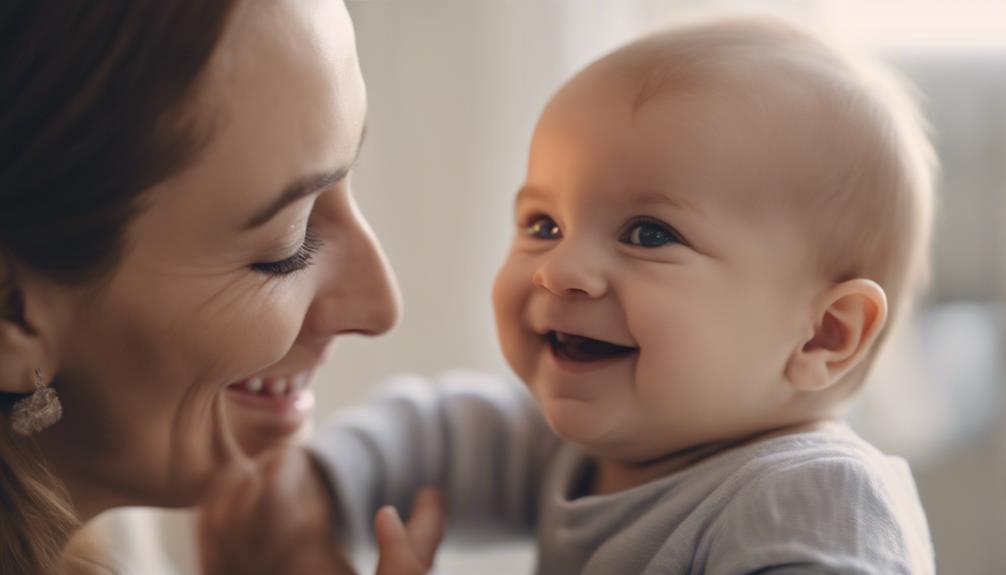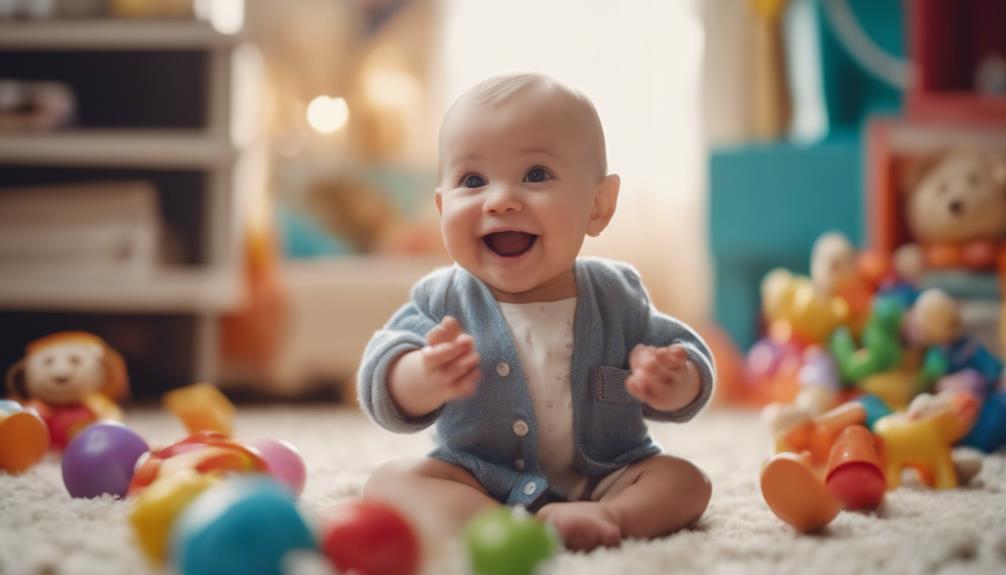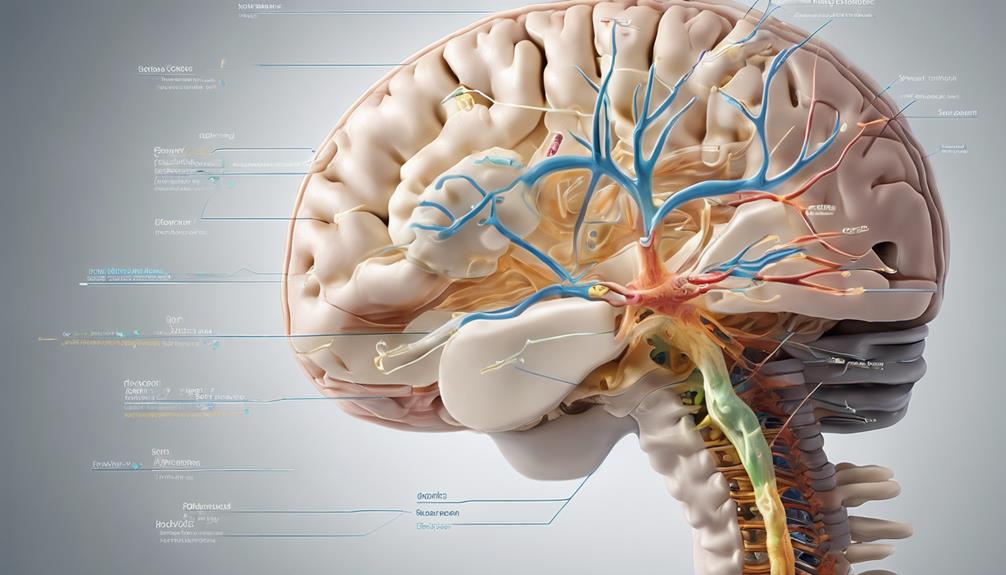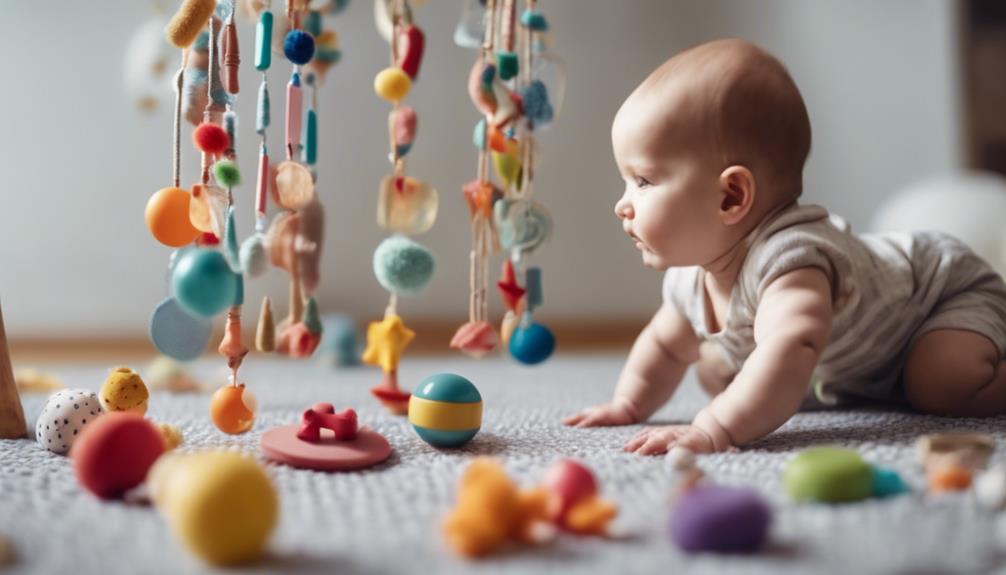Understanding the developmental milestones of a baby’s social skills is crucial for fostering their ability to communicate and form emotional connections. Babies begin to observe facial expressions of their caregivers early on, which helps them learn important social cues. From making cooing sounds at around 2 months to saying their first words between 9-12 months, vocal development plays a significant role. Establishing eye contact early on builds bonds and trust, starting within weeks of birth. Participating in turn-taking interactions at 4 months helps improve language skills and strengthens social connections. As babies begin to recognize themselves, they start forming their own identity. Around 6 months, empathy starts to develop, with playtime enhancing cognitive and social abilities. Your responsive caregiving influences their social development, laying the groundwork for their future growth.
Key Takeaways
- Babies start social interaction with eye contact and facial expressions from birth.
- Early vocal sounds at 2 months progress to babbling by 3 months.
- Turn-taking interactions begin around 4 months, aiding language development.
- Recognition of self contributes to a sense of identity and social growth.
- Babies show signs of empathy by responding to emotions at 6 months.
Early Social Interaction
Observing caregivers' facial expressions and reactions is vital for infants to learn social cues during early social interaction. From the moment they're born, babies are keenly attuned to the non-verbal signals their caregivers emit.
Eye contact, smiles, and other facial expressions play an essential role in bonding and communication. Babies as young as a few weeks old start imitating these expressions, laying the foundation for social interaction skills.
Responding promptly to a baby's cues and needs is key in building trust and security, forming a strong emotional connection between caregiver and child. Simple games like peek-a-boo not only bring joy but also aid in enhancing the baby's social skills.
Communication Development
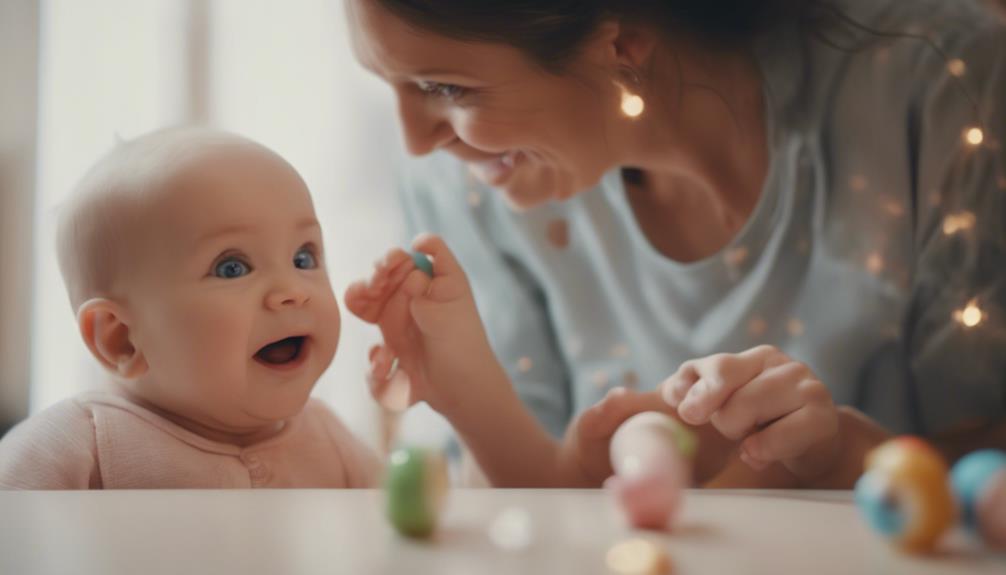
Around 2-3 months, babies begin communicating through cooing and babbling, laying the foundation for language development.
By 6 months, they start responding to their name and engaging in simple 'conversations' through vocalizations.
At 9-12 months, babies may say their first words like 'mama' or 'dada' and understand basic commands.
Early Vocal Sounds
From as early as 2 months old, your baby starts making cooing sounds as an essential step in their communication development. These early vocalizations are vital for your child's social and emotional development, as they learn to engage with caregivers through sounds.
By 3 months, babies progress to babbling, creating repetitive consonant-vowel combinations that indicate their growing communication skills. Around 6 months, infants begin imitating sounds they hear and start engaging in vocal turn-taking with you, further enhancing their ability to interact socially.
As your child approaches 9 months, their vocalizations become more varied and expressive, showing the development of their communication abilities. By 12 months, your baby can understand simple words and gestures, laying the groundwork for future language acquisition.
Encouraging and responding to your baby's early vocal sounds can greatly support their social and emotional growth as they learn to communicate with the world around them.
Eye Contact Cues
Babies naturally begin making eye contact within the first few weeks of life, indicating their early ability to connect with others. These eye contact cues play an essential role in their social development by fostering bonding, emotional connections, and the development of essential social communication skills.
When you maintain eye contact with your baby, it helps build trust and strengthens the emotional connection between you. Responding to your baby's eye contact cues not only promotes healthy social interaction but also aids in their overall emotional development.
It's important to note that babies may avert their gaze when they feel overwhelmed or overstimulated, signaling their need for a break. By recognizing and respecting these cues, you can help create a supportive environment for your baby to navigate social interactions comfortably.
Encouraging and engaging with your baby through eye contact sets a solid foundation for their future social interactions and emotional well-being.
Turn-Taking Interactions
At around 4 months of age, infants typically start engaging in turn-taking interactions in their communication development. This milestone marks the beginning of conversational skills and interactive communication abilities. Through turn-taking interactions, infants learn about social cues, reciprocity, and the rhythm of conversation.
Here are three key points to take into account:
- Language Development: Turn-taking interactions support the foundation for language development by introducing infants to the structure of conversations and the flow of communication.
- Social Bonding: These interactions foster social bonding between infants and caregivers, establishing emotional connections and building trust through responsive exchanges.
- Understanding Social Cues: By participating in turn-taking interactions, infants begin to recognize and respond to social cues, laying the groundwork for future social interactions and relationships.
Encouraging these interactions from an early age is essential for nurturing language skills, fostering social connections, and promoting overall healthy social development in infants.
Attachment and Trust Building
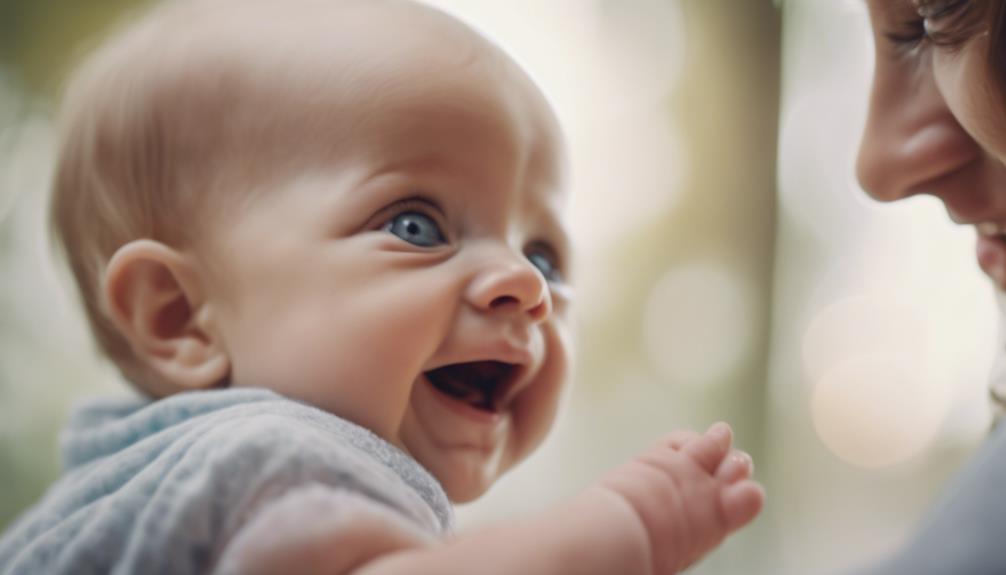
When it comes to building trust and forming attachments with your baby, remember that bonding through touch, maintaining eye contact, and practicing responsive caregiving techniques are essential.
These actions help establish a sense of security and confidence in your baby, allowing them to explore the world around them more freely.
Bonding Through Touch
Promoting attachment and trust building, touch plays a vital role in fostering a strong emotional connection between caregivers and infants. Skin-to-skin contact is a powerful way to establish this bond, creating feelings of security and comfort for the baby.
Here are three key points to remember about bonding through touch:
- Security and Comfort: Infants feel a sense of safety and reassurance when they experience physical closeness and nurturing touch from their caregivers.
- Emotional Regulation: Touch helps babies regulate their emotions, leading to a more stable and secure attachment with those who care for them.
- Development of Trust: Consistent and loving touch aids in building trust between infants and caregivers, laying a foundation for healthy relationships in the future.
Eye Contact Importance
Establishing eye contact with your baby is essential for building attachment and trust. Eye contact plays a vital role in helping babies feel secure and connected to their caregivers. Through eye contact, infants learn important social cues and communication skills, laying the foundation for healthy relationships. This direct gaze fosters emotional bonding and strengthens the caregiver-infant relationship, contributing to the overall social and emotional development of the child.
| Eye Contact Importance | |
|---|---|
| Keywords | eye contact, attachment |
| Key Benefits | – Builds trust and attachment |
| – Helps babies feel secure | |
| – Facilitates learning of social cues | |
| – Fosters emotional bonding | |
| Impact | – Strengthens caregiver-infant relationship |
Responsive Caregiving Techniques
Encouraging responsive caregiving techniques is crucial for fostering secure attachment and trust between you and your baby. By implementing these techniques, you can help nurture a strong bond and support your baby's emotional development effectively.
Here are three key practices to keep in mind:
- Promptly Responding to Needs: Being attentive and responsive to your baby's cues helps them feel secure and understood, laying the foundation for a trusting relationship.
- Physical Affection: Engaging in activities like skin-to-skin contact, holding, rocking, and cuddling promotes a sense of closeness and connection, contributing to a secure attachment.
- Communication Support: Making eye contact, talking to your baby, and responding to their sounds and gestures aid in establishing communication rhythms and fostering emotional development.
Recognition and Self-awareness
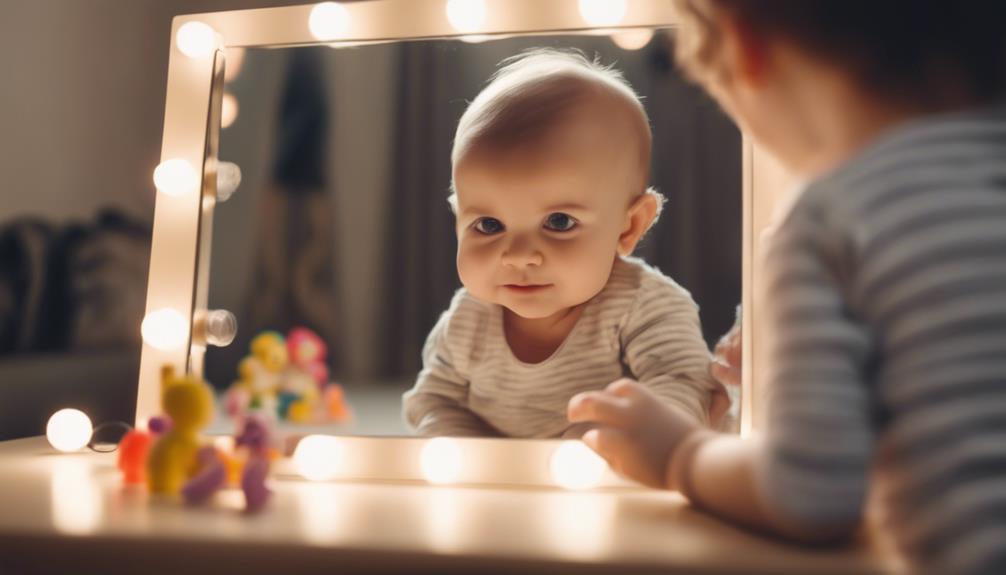
Developing self-awareness in babies typically occurs around 9-18 months when they start recognizing themselves in the mirror. This self-recognition is a significant milestone indicating cognitive growth and emotional development in infants. One way to assess this milestone is through the mirror test, where a baby shows signs of understanding that the image in the mirror is their own reflection.
Understanding self-awareness in babies is essential for caregivers as it helps them provide the necessary support for the infant's development. By recognizing themselves, babies begin to form a sense of identity and understanding of their place in the world. This milestone lays the foundation for further social and emotional growth in the child.
As babies become more self-aware, they also start to exhibit behaviors that show their recognition of themselves as individuals. This newfound understanding contributes to their overall social development and sets the stage for future milestones in empathy and emotional understanding.
Empathy and Emotional Understanding

Babies display early signs of empathy and emotional understanding by responding to others' emotions as early as 6 months of age. They start recognizing and mirroring facial expressions and gestures, showing a basic level of empathy towards those around them. By 12 months, infants can take it a step further by engaging in comforting behaviors towards distressed caregivers, indicating a growing emotional understanding.
Research indicates that infants as young as 18 months can exhibit simple forms of empathy, like sharing toys with a crying peer.
The development of empathy in babies is closely tied to secure attachments with caregivers, highlighting the importance of positive social interactions in fostering this trait.
Encouraging empathy and emotional understanding in infancy sets the stage for building healthy relationships and emotional regulation skills later in life.
Play and Exploration
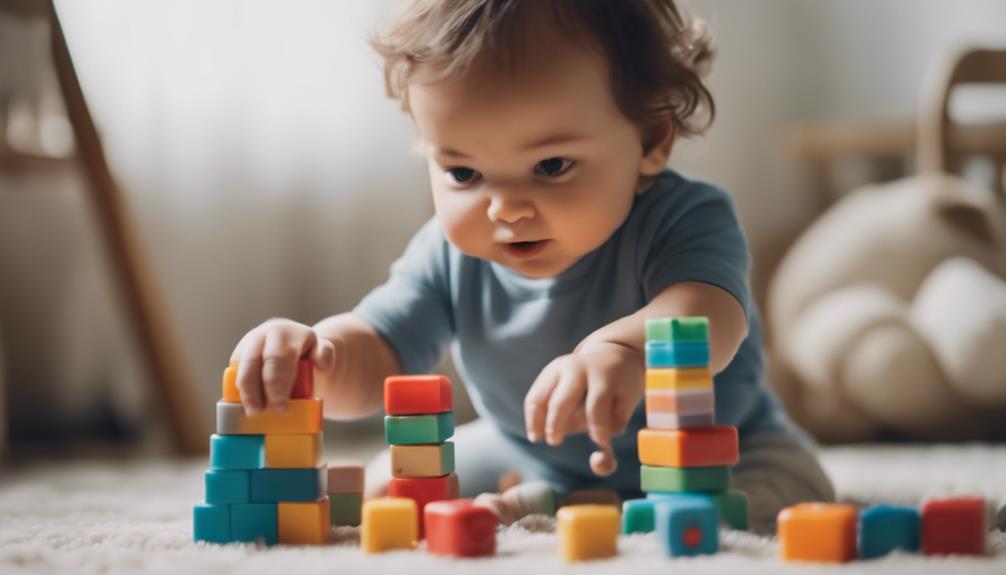
Play and exploration are essential for infants as they develop cognitive, social, and emotional skills. Through play, babies enhance their cognitive skills by engaging in activities that stimulate their problem-solving abilities and creativity. Exploration allows infants to learn about their surroundings, fostering curiosity and sensory experiences. Additionally, play supports the development of fine and gross motor skills, aiding in physical coordination and movement. Social-emotional development is also nurtured through play, as infants practice social interactions, communication, and empathy towards others. By engaging in play and exploration, babies start building relationships, developing a sense of autonomy, and laying the foundation for future social skills. Here is a breakdown of how play and exploration benefit infants:
| Benefits of Play and Exploration for Infants | |
|---|---|
| Cognitive Development | Problem-solving and creativity |
| Social Skills | Communication and empathy |
| Motor Skills | Fine and gross motor skills development |
Caregiver Role in Milestones

Caregivers play a pivotal role in nurturing infants' social development, fostering key skills like turn-taking and sharing. As a caregiver, your interactions with infants have a substantial impact on their social growth. Here's how you can help infants thrive:
- Build Secure Attachments: Providing a nurturing and responsive environment helps infants form secure attachments and trust in their caregivers, laying a strong foundation for healthy social interactions.
- Encourage Interactive Play: Engaging in interactive play and one-on-one time with infants not only strengthens the bond between caregiver and child but also helps infants learn essential social cues and communication skills.
- Recognize and Express Emotions: By responding promptly to an infant's needs and fostering positive interactions, caregivers play an important role in helping infants understand and express their emotions effectively.
Through your supportive and interactive caregiving, you can nurture infants' social development and help them navigate the world around them with confidence.
Nurturing Social Development
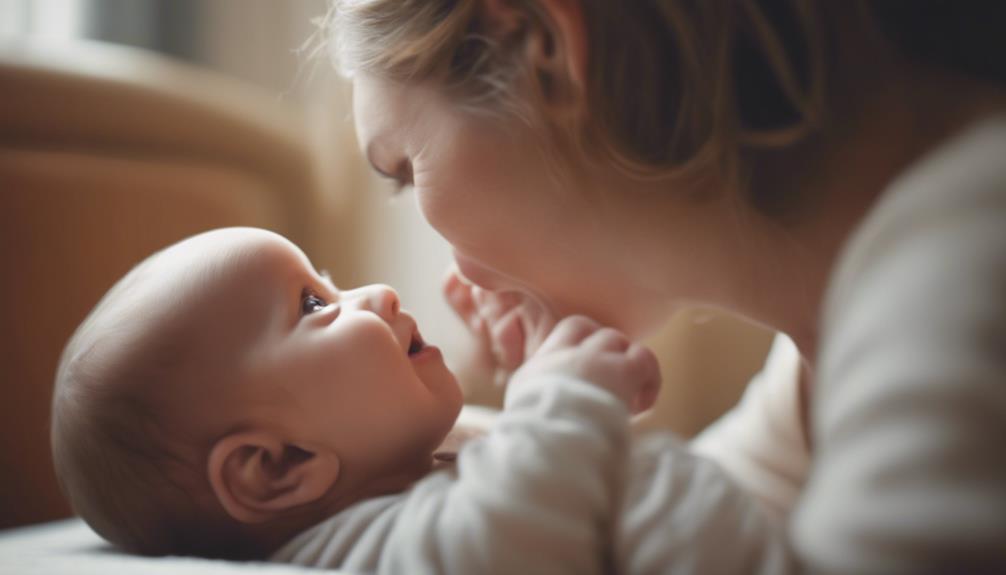
To support infants' social development, fostering secure attachments through responsive interactions is essential. Responding promptly to a baby's social cues helps build trust and emotional security.
Engaging in interactive play is another pivotal aspect that aids babies in developing social skills and bonding with caregivers. Encouraging eye contact and mimicking facial expressions can further enhance social and emotional development in infants.
Providing a safe and stimulating environment is paramount as it supports babies in exploring and learning social cues effectively. Ultimately, building a secure attachment with primary caregivers is indispensable for nurturing healthy social development in babies.
Frequently Asked Questions
What Are Some Social Milestones for Infants?
Social milestones for infants include imitating facial expressions at 2-3 months, engaging in social smiling by 4-6 months, showing fear at 7-9 months, enjoying games like peek-a-boo, recognizing words, and expressing feelings at 9-12 months.
What Can Social Milestones Tell You About a Child?
Social milestones can tell you about a child's ability to form relationships, regulate emotions, and communicate. Achieving these milestones on time indicates healthy development. They offer insights into attachment, social awareness, and potential developmental delays.
At What Age Should Babies Socialize?
Babies should start socializing with familiar faces as early as a few weeks old. As they grow, around 6-9 months, they show interest in other children. By 12-18 months, they engage in parallel play, and by 2 years, they form simple friendships.
What Are the Stages of Social Development?
Explore the stages of social development in babies: recognition of caregivers at 1-2 months, self-regulation and responsive smiles at 2-3 months, turn-taking conversations at 4 months, and environmental manipulation for social interaction at 4-5 months.
Conclusion
In summary, understanding your baby's social development milestones is essential for their growth and well-being. From early interactions to play and exploration, every milestone plays an important role in shaping their social skills.
So, keep nurturing their development with love and patience, because watching your little one reach these milestones is like witnessing a tiny miracle unfold before your eyes. Keep celebrating their progress and enjoy every precious moment together.

